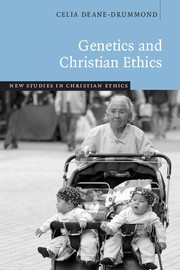Book contents
- Frontmatter
- Contents
- General Editor's preface
- Acknowledgments
- Introduction
- 1 A recovery of virtue for the ethics of genetics
- 2 Theological principles
- 3 Living in the shadow of eugenics
- 4 Genetic testing and screening
- 5 Genetic counselling
- 6 Gene therapies
- 7 Gene patenting
- 8 Women and genetic technologies
- 9 Genetics and environmental concern
- Postscript: Concluding remarks
- Bibliography
- Index
Introduction
Published online by Cambridge University Press: 05 June 2012
- Frontmatter
- Contents
- General Editor's preface
- Acknowledgments
- Introduction
- 1 A recovery of virtue for the ethics of genetics
- 2 Theological principles
- 3 Living in the shadow of eugenics
- 4 Genetic testing and screening
- 5 Genetic counselling
- 6 Gene therapies
- 7 Gene patenting
- 8 Women and genetic technologies
- 9 Genetics and environmental concern
- Postscript: Concluding remarks
- Bibliography
- Index
Summary
Perhaps one of the most fascinating facets of genetics is its place in the biological sciences, situated at the boundary of evolutionary biology and molecular biology. Such a juncture immediately raises historical questions about human origins, but also possibilities for further manipulation of human genes. Questions such as ‘Where do we come from?’ and ‘Where are we going to?’ are as much theological and philosophical as scientific. Hence, the subject of genetics has opened up swathes of associated debates in the humanities, as well as discussions in a purely scientific context of technical knowledge and possibilities. New scientific research and technological achievements are reported almost daily in the media, reflecting another point: that genetic research is of public and social interest, as well as scientific and ethical interest.
Bioethics has tended to look simply to medicine as a context for its discussion. However, the issues raised by genetics show up the limits of approaches that refer simply to medical frameworks and possibilities, defined by given principles of good practice. There has also been a tendency to split the evolutionary view of the gene, perceived as a discrete unit of inheritance, from more molecular models that are becoming increasingly sanguine about the possibility of defining clearly what the scope of gene function might be. For example, the discovery that humans had only around 20,000–30,000 genes, contrary to expectations, showed that there was more to genetics than simply analysing one-to-one gene function; the expression of these genes and their regulation could also have a profound effect on characteristics of both a species and an individual.
- Type
- Chapter
- Information
- Genetics and Christian Ethics , pp. xvi - xxivPublisher: Cambridge University PressPrint publication year: 2005

